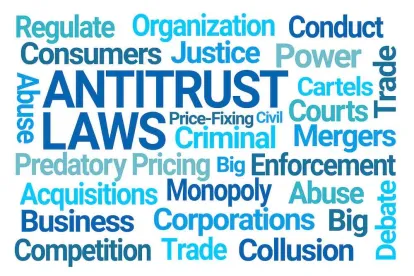The antitrust outlook in the United States is marked by uncertainty. This article identifies some issues to watch.
Some Recent Surprises
Historically, U.S. antitrust enforcement has been marked more by continuity than by abrupt change. During the past few decades, we saw an evolution away from blanket rules of per se legality or illegality under federal law (e.g., resale price maintenance and inflexible merger standards), a greater emphasis on economic analysis of likely competitive effects, and an attempt to strike a balance between overly aggressive enforcement (which inhibits potentially procompetitive conduct benefiting consumer welfare) and overly lenient enforcement (which risks adverse consumer welfare consequences).
During the Trump administration, however, we saw some surprising Department of Justice (Antitrust Division) (DOJ), Federal Trade Commission (FTC) and state Attorneys General enforcement priorities, outcomes and clashes. These included:
-
Behavioral Relief. DOJ’s strong disfavor for accepting behavioral relief in merger reviews was reflected in its refusal to accept conduct remedies in, and subsequent failed effort to block, the vertical Time Warner/AT&T combination. DOJ recently reasserted this disfavor in a new Merger Remedies Manual, released September 3, 2020, which declared that structural remedies “are strongly preferred in horizontal and vertical cases.”
-
Agency Clash. DOJ engaged in public criticism of and opposition to FTC’s successful district court challenge of Qualcomm’s licensing practices relating to standard essential patents addressing 4G transmission technologies, an outcome subsequently reversed by the Ninth Circuit in August 2020.Also note that DOJ issued the new Merger Remedies Manual noted above unilaterally, without separate adoption by the FTC.
-
State AG Activism. DOJ approved the merger of Sprint and T-Mobile, subject to significant divestiture obligations. That approval was followed by a failed litigation effort by numerous state AGs to challenge that very transaction and the DOJ-approved structural remedies.
New Administration Surprises?
The Biden administration will presumably bring new enforcement priorities and direction to both DOJ and FTC. While its proposals for new agency leadership have not yet been announced, those nominations should provide some insight into possible enforcement priority direction. Possible changes include:
1. The Consumer Welfare Standard
One fundamental question is whether the Biden administration will entertain proposals to reexamine the purposes of antitrust enforcement. For decades, federal antitrust enforcement has been driven by the “consumer welfare” standard, which seeks to evaluate both transactions and conduct based on their impacts on consumers.
At the same time, however, there is a broader debate over the scope of that established goal and whether the objectives of antitrust enforcement should change and the tools of enforcement should be expanded. Aggressive “reform” proposals have been advocated by 2016 presidential candidates Elizabeth Warren and Bernie Sanders. In 2017, Sens. Warren and Chuck Schumer (and others) rolled out a “Better Deal” platform for the 2018 congressional elections. Sen. Sanders more recently proposed antitrust enforcement reforms that eclipse that “Better Deal” platform. The proposals, among other things, advocate replacing the consumer welfare standard with a broader standard that considers various merger impacts unhinged to “competition” or “competitive effects.” For example, some advocates have suggested that merger reviews should also address such issues as labor effects, environmental issues, racial impacts, and wealth inequality concerns. These proposals are sometimes referred to as the “hipster” antitrust movement. Such an expansion of the cognizable issues relevant to a merger review could substantially alter the predictability of agency merger enforcement efforts.
2. Agency Interest in Vertical Mergers
On June 30, 2020, the FTC and DOJ released their first jointly issued Vertical Merger Guidelines. These new guidelines did not disclose any significant policy changes, but they did elaborate on vertical merger review topics such as the evaluation of the “net effects” of the combination’s potential for foreclosure and other competitive effects such as the elimination of double marginalization. These new guidelines followed DOJ’s loss in its challenge of the vertical Time Warner/AT&T transaction.
Were the Biden administration inclined to increase scrutiny of vertical mergers, it presumably would nevertheless follow the analytical guidance set forth in the new (and unsurprising) Vertical Merger Guidelines. That increased scrutiny could come through a more concerted effort to review vertical transactions with the potential to foreclose competitors, raise rivals’ costs, or result in the exchange of competitively sensitive information. These vertical merger concerns are already articulated in the new Vertical Merger Guidelines.
3. State Attorney General Activism
Antitrust opposition by state AGs – at least in the form of an independent legal challenge in court – to a merger approved at the federal level by DOJ or FTC is unusual. Nevertheless, such a state AG challenge occurred in the Sprint/T-Mobile transaction. We also see considerable state AG activism in various investigations of “Big Tech,” raising the question of possible divergence between state AG and federal treatment of those matters.
Such state AG antitrust activism appears much higher today than in prior decades. We can expect such activism to continue during the Biden administration. One impact of such increased activism could be an increase in the consideration given by FTC and DOJ to state AG remedy recommendations in antitrust settlements. In contrast, the risk of unilateral state AG challenges in situations in which one or more state AGs are not satisfied with a DOJ or FTC settlement agreement will expose those transactions to greater timing and deal risk.
4. DOJ Prosecution of Cartel Behavior
Regardless of the Biden administration, DOJ will continue to investigate and, where appropriate, prosecute cartel behavior. This area of antitrust enforcement has wide bipartisan support.
We should not forget the lessons of DOJ’s long-running investigation of auto parts suppliers, one of the largest criminal investigation ever pursued by its Antitrust Division, which resulted in charges against some 48 companies and yielded almost $3 billion in criminal fines. Settlements of class action and other private plaintiff claims have reportedly exceeded $1 billion.
An effective antitrust compliance program, in addition to detecting and deterring cartel conduct, now brings additional benefits. While DOJ has historically not given credit for antitrust compliance programs in making charging decisions and sentencing recommendations, it announced changes to both policies in July 2019. These long-needed changes increase the legal benefits of implementing an effective antitrust compliance program.




 />i
/>i

